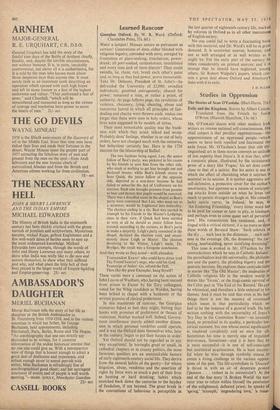Learned Rancour
WHAT a subject! Human nature as putrescent as carrion! Generations of dons, either blinded with religious bigotry, corroded with envy, enraged by frustration or place-seeking, treacherous, power- drunk; all port-soaked, cantankerous, uninhibited and every man jack of them literate! They could swindle, lie, cheat, riot, break each other's pates and, so long as they had power, prove immovable. Take Dr. Delaune, President of St. John's—he defrauded the University of £2,000; swindled individuals; gambled outrageously; abused his power; remained a man, or rather a priest, of authority. As page follows page, the revelation of violence, chicanery, lying, cheating, abuse and rancorous hatred in which all principles of fair- dealing and charity were thrown aside, makes one forget that these were men in holy orders, whose lives were supposed to be models of virtue.
Their most remarkable quality was the frank- ness with which they acted, talked and wrote. Probably dons' feelings, whether in or out of holy orders, have not changed much with the centuries, but behaviour certainly has. Here is the 1726 election for the Mastership of Balliol : The two factions being equal, Lux, the senior fellow of Best's party, was picketed in his rooms by his friends to save him from the other side, who stuck at nothing to get him brought out and declared insane; while Best's friends strove to have Quick, the junior fellow of the opposite side, deprived as a non-juror because he had failed to subscribe the Act of Uniformity on his election. Each side brought pressure from parents to bear and threats that pupils would be removed. There was a dreadful scene in the chapel as Best's party were convinced that Lux, who must act as a scrutator, would be frightened into imbecility. The election ending in a tie, Best was carried in triumph by his friends to the Master's Lodgings, since in their view, if Quick had been entitled to vote at all he should as junior fellow have crossed, according to the statutes, to Best's party to make a majority. Leigh's party remained in the chapel, declared the election void, and unani- mously chose Leigh as Master. The election devolving to the Visitor, Leigh's uncle, Dr. Brydges, the result was a foregone conclusion.
And they wrote as they acted—with abandon. Transcendent Knave! who could have closer trod Thy Friend Iscariot's steps, who sold his God Transcript of Judas! Go, refund the Pelf, Then like thy great Exemplar, hang' thyself !
These verses were a comment on the action of John Leaves of Wadham,who,having been rescued from prisOn in Exeter by his Tory colleagues, voted for the Whig candidate as Warden, having been bribed in chapel with a banknote or the written promise of clerical preferment.
In this maelstrom of rancour, the Georgian ministries fished as best they might, baiting their hooks with promises of preferment or threats of visitations. Neither worked well. Indeed, Govern- ment interference merely added another dimen- sion in which personal vendettas could operate, and it was the Oxford dons themselves who, later in the century, began to put their houses in order.
Yet Oxford should, not be regarded as in any way exceptional. In boroughs great or small, in cathedral chapters or in county politics, the same ferocious qualities are an unmistakable feature of early eighteenth-century social life. They derive from the natural habits of the gentry—for whom litigation, abuse, vendettas and the assertion of rights by force were as much a part of their lives as hunting or hard drinking; habits which stretched back down the centuries to the heyday of feudalism, if not beyond. The great break in the conventions of behaviour is perceptible in
the last quarter of eighteenth-century life, marked by reforms in Oxford as in all other institutions of English society.
No one could fail to write a fascinating book with this material, and Dr. Ward's will be in great demand. It is somewhat uneven, however, and not as well arranged or as well written as it might be. For the early part of the century he relies considerably on printed sources; and it is strange that he should have neglected, among others, Sir Robert Walpole's papers, which con- tain a great deal about Oxford and Atterbury's links with it in exile.
J. H. PLUMB


































 Previous page
Previous page